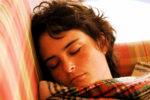
Sleep well to maintain bone health experts advise in light of new research

Getting too little sleep is linked with a higher risk of having low bone mineral density and developing osteoporosis in older women says a large study in the Journal of Bone and Mineral Research.
In the study of over 11,000 postmenopausal women, those who reported sleeping five hours or less a night had lower bone mineral density compared with women who reported sleeping seven hours per night.
“Our study suggests that sleep may negatively impact bone health, adding to the list of the negative health impacts of poor sleep,” says lead author Dr Heather Ochs-Balcom. “I hope that it can also serve as a reminder to strive for the recommended seven or more hours of sleep per night for our physical and mental health.”
TOP TIPS FOR A GOOD NIGHT’S SLEEP
Keep regular sleep hours. Going to bed and getting up at roughly the same time every day programmes your body to sleep better.
Create a restful sleeping environment. Temperature, lighting and noise should be controlled so that your bedroom environment helps you to fall (and stay) asleep. Move pets out of the bedroom if they disturb you in the night.
Make sure your bed is comfortable. It’s difficult to get restful sleep on a mattress that’s too soft or too hard, or a bed that’s too small.
Exercise regularly. Moderate exercise on a regular basis, such as swimming or walking, can help relieve some of the tension built up over the day.
Cut down on caffeine. Caffeine in tea, coffee, energy drinks and soft drinks interferes with the process of falling asleep and prevent deep sleep. Instead, have a warm, milky drink or herbal tea.
Do not over-indulge. Too much food or alcohol, especially late at night, can interrupt sleep patterns. Alcohol may help you to fall asleep initially, but will disrupt sleep later in the night.
Do not smoke. Nicotine is a stimulant so people who smoke take longer to fall asleep, wake up more frequently, and have more disrupted sleep.
Try to relax before going to bed. Have a warm bath, listen to quiet music or do some gentle yoga to relax mind and body.
Write away your worries. If you tend to lie in bed thinking about everything you have to do tomorrow, set aside time before bedtime to make plans for the next day. The aim is to avoid doing these things when you’re in bed.
If you cannot sleep, get up. Don’t lie there worrying about it. Get up and do something you find relaxing until you feel sleepy again, and then go back to bed.
Source: NHS
Arthritis Digest Magazine was selected by Feedspot as one of the Top 5 Arthritis Blogs on the internet in 2018.
For more in-depth features, interviews and information, subscribe to Arthritis Digest magazine, a popular title that’s published six times a year. Click here for the digital version or tel 0845 643 8470 to order your had copy. You’ll know what your doctor is talking about, what new drugs are in the pipeline and be up to date on helpful products.
